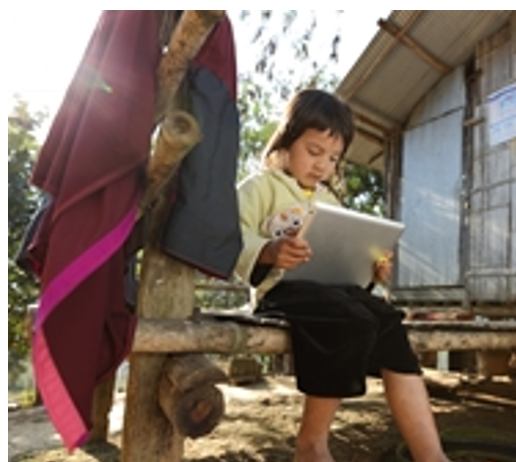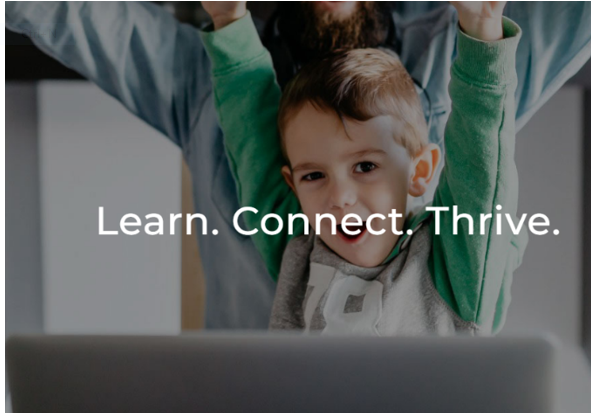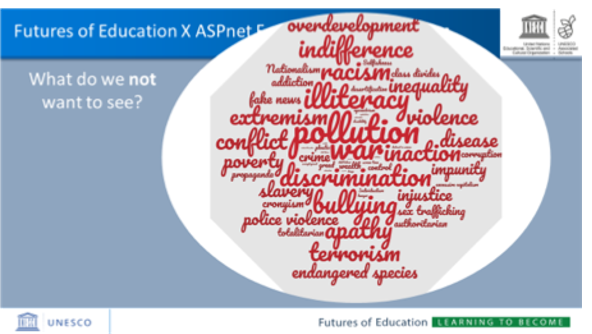Dear ASPnet community,
Dear National Coordinators,
Dear teachers, students and parents,
 Around this time last year, our newsletter CONNECT was launched with the aim of enhancing the connectivity and solidarity among the ASPnet members due to unprecedented pandemic-related school closures. In this issue, we want to talk about what has become increasingly important to you, resulting from our various activities and events over the past year.
Around this time last year, our newsletter CONNECT was launched with the aim of enhancing the connectivity and solidarity among the ASPnet members due to unprecedented pandemic-related school closures. In this issue, we want to talk about what has become increasingly important to you, resulting from our various activities and events over the past year.
We listened to you and concluded that the most relevant topics emerging are the emotional well-being, and social and emotional learning in and through education! Therefore, you will find in this issue a focus on these topics…
We want to present to you the examples of what UNESCO has been doing in the domain of social and emotional learning, and especially the examples concerning Early Childhood Care and Development since the voices of this age group are not heard as often as those of older students.
Therefore, we also want to share with you a special message from Ms Rokhaya Diawara, Coordinator of Early Childhood Care and Education at UNESCO, on the importance of learning in the early years, and some great examples of Social and Emotional Learning in Early Childhood promoted by UNESCO’s Bangkok Office.
This issue also features the “Power of Zero” initiative which deals with the development of online learning materials for young children with a special focus on transmitting values and keeping children safe while ensuring their well-being when exposed to online content. My special thanks goes to Nicholas Carlisle who kindly accepted to be interviewed and share his message.
Last but not least, we want to update you on our recent “ASPnet x Futures of Education” webinars, to which many of you made many great contributions. I would like to express my sincerest gratitude to all the National Coordinators and ASPnet school leaders, teachers, and students and their parents who engaged in this global reflection and debate on how education needs to be reimagined towards 2050 and beyond. Your voices are being heard and will be reflected in the global flagship report published by the International Commission on the Futures of Education in November this year.
It is an honor for the ASPnet International Coordination team to liaise your exceptional achievements with the prioritized objectives of UNESCO over the course of the past year, which as you know was very challenging. Again, we congratulate you on your extremely valuable and valued voices, ideas, new inspirations, and shared experiences.
Stay safe. Stay CONNECTed!Julie Saito, ASPnet International Coordinator

Special message from Rokhaya Diawara, Coordinator of Early Childhood Care and Education, Division for Policies and Lifelong Learning Systems
|
UNESCO's work on equipping young children with the skills to live well online and offline
Social and Emotional Learning at UNESCO
UNESCO's
Mahatma Ghandi Institute of Education for Peace and Sustainable Development has undertaken considerable work on SEL including the publication of the report
Rethinking Learning. The institute's work includes the vision for "Transforming Education for Humanity by Building Social and Emotional Learning for Education 2030", focusing on the achievement of the UN Sustainable Development Goal 4.7 towards education for building peaceful and sustainable societies across the world. The MGIEP contributes to the attainment of the goal by developing programmes promoting social and emotional learning, producing the innovative digital pedagogies and empowering the youth.
Based on that vision, the institute recently organized a joint workshop with UNESCO's Section of Global Citizenship and Peace Education at UNESCO Headquarters with the overarching intent to improve UNESCO's ability to support countries in their efforts to provide equitable and inclusive quality education to all learners throughout life (SDG 4) by using up-to-date evidence on the benefits of social and emotional learning to improve the content, delivery and learning outcomes of education. The deliberations, which were the outcome of the workshop, aim to guide the design of guidance tools for the effective integration of SEL throughout the whole education system.
Social and Emotional Learning in early childhood
Further developments concerning SEL with a specific focus on Early Childhood Care and Education have been done by the UNESCO Bangkok office which published two sets of ECCE Teacher Competency Framework (TCF) for Southeast Asia and the Pacific SIDS, including the
ECCE Teacher Competency Framework for South East Asia and the
ECCE Teacher Competency Framework for the Pacific.
Based on these TCF, a regional teacher training handbook and 11 pre-service modules on Social and Emotional Learning are currently being developed and expected to be finalized by mid-2021. You can look at the
project brief
for further information.
"Power of Zero" - Global campaign to give power and protection to young children online
 The
Power of Zero is a global campaign on equipping young children with the life skills needed to safely negotiate the online world and harness its positive powers to learn and live better. The internet has been vitally important in helping teachers and children connect and ensure the continuity of learning, but we also need to be aware of its downsides.
The
Power of Zero is a global campaign on equipping young children with the life skills needed to safely negotiate the online world and harness its positive powers to learn and live better. The internet has been vitally important in helping teachers and children connect and ensure the continuity of learning, but we also need to be aware of its downsides.
Firstly, not everyone has internet access which leads to the exclusion of some children from participating in online schooling. Secondly, successful learning occurs only when teachers and parents give significant emotional and practical support to their children. Young children were not designed to spend long hours in front of the screens and need extra motivation to spend a longer period of time in learning online. Finally, children need to be educated on who to trust and what to believe online.
The campaign is based on the concept of the 12 Powers of Good, among which are critical thinking, respect and inclusivity, and it offers learning materials and resources to schools and families around the world. UNESCO is one of the campaign's founding partners and has representatives in its Global Steering Committee and Advisory Group.
How the Power of Zero works
The campaign works with the educational publisher Scholastic and offers fun and free lessons and activities that help students learn positive online behaviors. Topics include Managing Emotions, Why Words Matter, and Find the Feeling, among others.
 Skills and values in an online world
Skills and values in an online world
Interview with Nicholas Carlisle, Director and CEO of "The Power of Zero"
"We are really helping children to make them aware of what they are feeling inside, and when something online is not feeling good, they know what to do about it"
See the
full interview video and biography
|
Having in mind the amazing work the Power of Zero has been doing, the ASPnet started a collaboration with this global campaign, and we are currently developing a survey which aims to assess the experiences, needs and other relevant information on online access and exposure of young children. We will update you on the progress and further details of the survey.
Recent UNESCO activities
February 21 UNESCO celebrated multilingualism on International Mother Language Day -
Each year, UNESCO celebrates the importance of cultural and linguistic diversity for sustainable societies during the International Mother Language Day. Presently, the linguistic diversity is increasingly threatened on a global scale with more and more languages disappearing and 40 percent of the population being without access to an education in a language they speak or understand. This year's theme was
'Fostering multilingualism for inclusion in education and society,' which was celebrated in a webinar that highlighted the fact that languages and multilingualism can advance inclusion and the aims of the Sustainable Development Goals.
March 8 International Women's Day focused on the gender gap in ICTs -
This year, UNESCO marked
International Women's Day by focusing on the persistent and severe gender gap in digital skills and the AI Sector. A special panel reflected on how to help women and girls develop strong AI skills, and explored how to address the "ICT gender-equality paradox" and ensure women's full participation in the design, development, and deployment of AI systems.
March 21 International Day for the Elimination of Racial Discrimination -
The UN General Assembly resolution 2142 (XXI), adopted on 26 October 1966, proclaimed 21 March as the
International Day for the Elimination of Racial Discrimination to be commemorated annually. It marks the date in 1960 when police opened fire and killed 69 people at a peaceful demonstration in Sharpeville, South Africa, against the apartheid "pass laws". Over the years, UNESCO has celebrated International Day with events at its Paris Headquarters and its field offices, as well as in cooperation with the member cities of the International Coalition of Inclusive and Sustainable Cities – ICCAR. The struggle against racial discrimination is a central element of UNESCO's work to build peace through education for tolerance and the rejection of racist stereotypes that may persist in culture or in the media.
News from ASPnet
A huge success on ASPnet x Futures of Education webinars!
Thanks to all of you, the recently held
ASPnet x Futures of Education webinars on sharing country experiences of the focus groups held over the past six months were a huge success! This important initiative is an ambitious attempt to rethink education and help shape the future since it catalyses a global debate on how education, learning, and knowledge need to be re-imagined in a world of increasing complexity, uncertainty, and precarity. Its work is guided by a high-level International Commission of thought-leaders from diverse fields and coming from different regions of the world. In November 2021, the Commission will publish a report to share a forward-looking vision of what education and learning might yet become alongside developing a policy agenda.

Within this context, a special consultation for ASPnt teachers, students and their parents were held to engage them in joint reflections and co-construction of ideas and perspectives on what the futures of education ought to be, while contributing to the Commission's work. Around 100 focus groups have been organized in all the regions of the world.
From ASPnet, over 2000 ASPnet students, teachers, school principals, and parents from across the world engaged in debates on rethinking the education which fosters global citizens for sustainable development.
The three webinars, held in English, French/English, and Spanish/English were a demonstration of a great engagement and contributions to the collaborative initiative ASPnet X Futures of Education that brought 479 participants from 87 countries together. A special thanks go to the ASPnet National Coordinators and teachers from Canada, China, Greece, Indonesia and Slovakia (EN session), Finland, Republic of Korea, Haiti, Lebanon and Rwanda (FR/EN session), Angola, Costa Rica, Portugal and Spain (SPA/EN session).

Thanks to a very professional and effective coordination of the webinars by the two great facilitators, Mr Fernando M. Reimers, Professor at Harvard Graduate School of Education, and Mr Abdel Basset Ben Hassen, President of the Arab Institute for Human Rights in Tunisia contributed, both also being members of the International Commission on the Futures of Education, the webinars were a great success! The three events were a great opportunity for ASPnet to unleash the potential of our network!
We will report in much more detail on the events and the next steps shortly. In the meantime, you can find
more information on the ASPnet website!
ASPnet on the ground – the "We are all global citizens" initiative
The National Coordination of ASPnet Germany called on German UNESCO Associated Schools to contact their partner schools worldwide and create a symbol of solidarity during the global crisis. Schools and other partners from 26 countries and five continents sent photos, videos and texts about their experiences during the pandemic. More information here